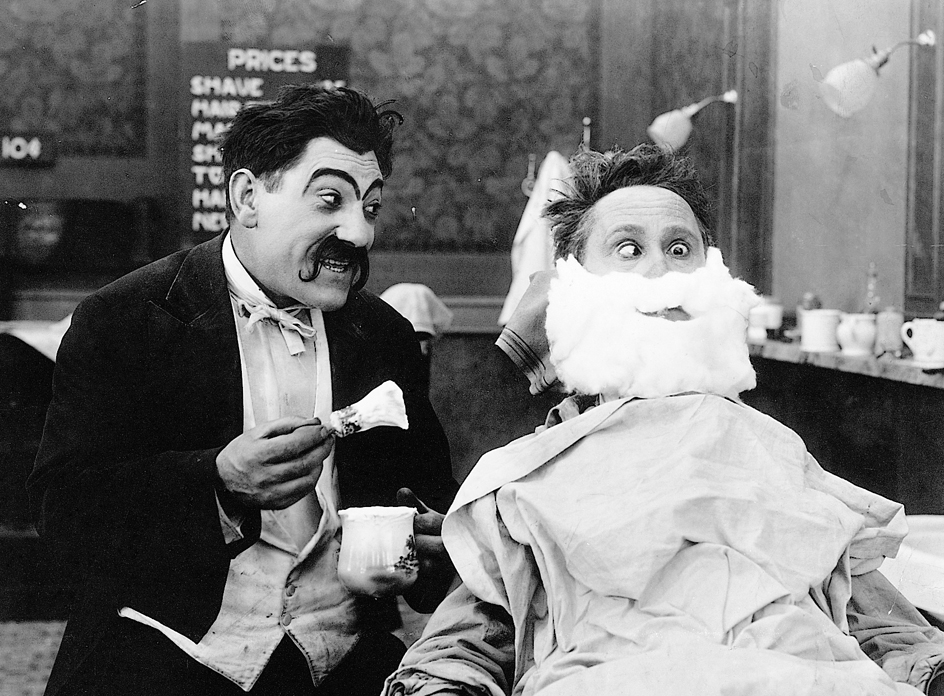Humor. No one knows exactly why we laugh or why anything that is funny should cause us to make such a peculiar noise. It would be just as logical to stick our thumbs in our ears and wiggle our fingers as it is to giggle or bellow or howl with laughter. But when something strikes our “funny bone,” our diaphragm flutters up and down, and we laugh.
The urge to laugh appears very early. Babies smile, then coo, and finally chuckle when pleased. If certain parts of the baby’s body are tickled with the fingers, laughter occurs. But by the time children attend school, they also laugh at things they hear and see.
Stories are among the most popular forms of humor. As a rule, a story is considered inferior if it embarrasses someone, if it makes something sacred appear common, if it makes a person’s weakness the cause for laughter, if it has to have vulgarity to be funny, or if everyone cannot join in the enjoyment of the joke.
The humor of situation
If a man meets a lady on the street, tips his hat to her, and a pigeon flies out from beneath it, most of the people who see it would roar with laughter. This is called the humor of the unexpected happening.
Another kind of situation humor is the incongruous (putting together unrelated things). Boys and girls see dogs every day and think nothing of them. But if a dog enters a classroom, everyone laughs. The dog does not belong there, and the situation is incongruous.
The humor of words
Situation humor need not be described in words. By far the greatest amount of humor is told rather than seen. Certain words are funny in their very sounds, like bobble and squirt. Sometimes people get mixed up in pronouncing their words, and instead of saying “people think,” they might say “thinkle peep.”
Puns,
or double meanings, furnish us with much of our humor. Puns are plays on words, in which one word is said when another one is meant. For example, it is said that Ben Jonson was asked by a friend to make a pun. Ben replied, “Pun what subject?” for “Upon what subject?” The friend laughed at this pun, but said, “Oh, the king.” Ben then said, “But the king is not a subject. He is the king.”
Hyperbole
is simply exaggeration. Sometimes it includes a twisting or distortion of the truth for the sake of humor. Common expressions of everyday life are often hyperboles. If a woman says “It’s raining cats and dogs,” she is using hyperbole. And if she is answered with “I know. I just stepped in a poodle,” she hears a pun.
Repetition
is also a popular way of gaining laughter, but it does not produce a very high grade of humor. In many of the jokes told, a thing happens twice in exactly the same way. But the third time it happens differently, and the point of the story is revealed.
A man’s car stuck in the mud one rainy day. He walked to the nearest farmhouse to telephone for help. The farmer had no telephone, but said the farm down the road had one. Muttering angrily, the man plodded on through the rain. The second farmer’s telephone was out of order, but this farmer said another farm still farther down the road had one. The motorist was near the exploding point when he reached the third farm. As the farmer shuffled to the door, the motorist yelled, “You idiot! I wouldn’t use your phone even if you had one!”
Comparison and contrast
often give rise to humor. They are almost the same as the incongruous situation. “My head’s as clear as a bell. In fact, I hear it ringing” shows comparison. Contrast is illustrated in such expressions as “not enough sense to varnish a walnut.”
The types of humor
Humor of words takes many forms. It can be gentle and kindly, or it can be harsh and biting. There is no exact distinction between these various types of humor.
Wit
differs from most humor in being purely intellectual, rather than relying on incongruities that come up naturally. Most humor produces a smile, but wit usually causes people to break out in sudden laughter.
Satire
presents the weaknesses of humanity and makes fun of them. Usually, satire attempts to cure the foolishness by making people laugh at it.
Sarcasm
is much more brutal than satire. It often takes the form of a biting speech. If one woman says to another woman, “That’s a lovely dress, dear. Too bad they didn’t have your size,” the woman is sarcastic.
Irony
implies the opposite of what is apparently being stated. Irony may begin as a compliment or a simple statement, but it conceals a sting in the remark. It is usually expressed by a tone of voice, and is often an understatement. A sign on freshly seeded grass may say only “Please,” but probably means, “Have enough sense to stay on the sidewalk, where you belong!”
Farce, slapstick, and buffoonery
involve such pranks as throwing custard pies or pushing unsuspecting persons into swimming pools.

Parody and burlesque
change the wording of a well-known story or song to produce comic results.
Mimicry
imitates another person’s habits, gestures, or speech for comic effect.
